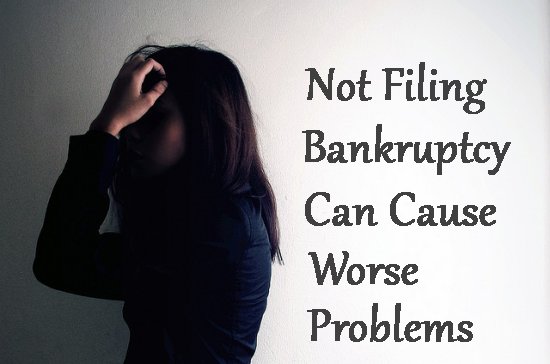
We wrote yesterday about a recent study that showed that bankruptcy reform has harmed many consumers. For those that worry that filing bankruptcy can bring negative consequences, you should know that not filing can hurt you more. Many who are deep in debt will soldier on and let things continue to get worse because they don't know that bankruptcy can help. Or, they believe that the fallout from bankruptcy is just as bad as being in debt. Nothing could be further from the truth. Here are five ways that lingering in debt and not filing bankruptcy can make your life worse.
#1 Wrecked Credit Score
Even though filing bankruptcy does lower your credit score in the short run, in the long run, it can boost it significantly. Here's why. When you allow debt to linger, your credit score will get lower and lower. Then, when debts go into collections, it triggers a second entry on your credit report for that account and this collection account further lowers your credit score. These will linger until the items fall off your credit report which will take seven years or longer if you make occasional payments. By contrast, filing bankruptcy clears these old items off your credit so that they don't continue to degrade your score. Then once you get new credit opportunities, your score starts to rebound rapidly.
#2 Inevitable Foreclosure
The study by the Federal Reserve we mentioned shows that foreclosures occur much more frequently for those that do not file bankruptcy than for those that do. Here's why. If you're current on your mortgage payments, filing Chapter 7 will not affect it – you won't have to surrender your home so long as your equity doesn't exceed the North Carolina homestead exemption. Then the money you free up not dealing with other debts can allow you to more easily make your mortgage payments. And, once your credit score improves, you can refinance. But those with lingering debt will find themselves increasingly unable to pay their mortgage and may even be hit with leins that force them into foreclosure.
#3 Ongoing Stress
Excessive debt is stressful. That's a proven fact. It takes its toll on your health and mental and physical well-being. Here's why. Debt causes not only depression but can weaken your immune system to the point that you may be more prone to illness. All this can make it harder for you to focus on work, can even cost you your job and can make life feel like it's not worth living. Every time the phone rings, you may feel dread because you know it's someone calling to hassle you for money. You'll be scared to answer your phone, embarrassed when you get collection calls at work, and all of this eats away at your self-esteem and ability to have any quality of life. It doesn't have to be this way.
#4 Lost Job Opportunities
The lower credit score that comes with continued bad debt can cost you job opportunities. Here's why. Many more employers now require credit checks as part of pre-employment screenings even for positions that have nothing to do with cash handling or finance. It's just one more way of thinning a field of applicants. By not using bankruptcy to increase your declining credit score, you can miss out on opportunities for better paying jobs that can further increase your financial stability. It's a losing cycle of not being able to pay debts because you can't get a good job and not being able to get a good job because you can't pay your debts. This is no way to live.
#5 Increased Costs of Living
Having a pile of debt and a lower credit score can have the cumulative effect of increasing your expenses. Here's why. Many services that seem to have nothing to do with credit rely on credit to assess your charges. Auto and homeowner's insurance rates are largely determined by credit rating. An efforts to get credit will result in much higher interest rates and less favorable terms. Existing credit providers may increase your interest rates based on your declining credit ratings – credit card issuers are known for this. You may not be able to get a bank account and may rely on check cashing firms to convert your paychecks to spendable currency and they charge stiff fees. This is no way to run your life.
Please read the original post on our affiliate site, BillsBills.com
